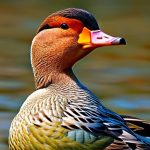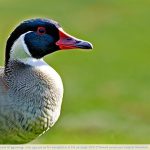Geese can be a beautiful addition to any natural landscape, but they can also be a nuisance when they invade gardens and lawns. Their voracious appetites and messy habits can wreak havoc on carefully tended plants and grass, leaving behind a trail of destruction. This can be particularly frustrating for gardeners and homeowners who take pride in their outdoor spaces. Geese are also known to be aggressive and territorial, which can pose a threat to people and pets who may inadvertently wander into their territory. Finding effective and humane ways to keep geese out of gardens is a common challenge for many property owners.
Key Takeaways
- Geese can be a nuisance in gardens, causing damage to plants and leaving behind droppings.
- Hedges can serve as a natural deterrent for geese, providing a physical barrier and visual obstruction.
- Choosing the right type of hedge, such as dense and thorny varieties, can effectively keep geese out of gardens.
- Proper maintenance and strategic placement of hedges is essential for maximizing their effectiveness in deterring geese.
- Other methods, such as decoys, repellents, and exclusion devices, can be used in conjunction with hedges to further discourage geese from entering gardens.
The benefits of using hedges as a deterrent for geese
One effective and aesthetically pleasing solution to keeping geese out of gardens is the use of hedges. Hedges serve as a natural barrier that can deter geese from entering a specific area. They provide a physical obstacle that can discourage geese from landing and foraging in gardens and lawns. Additionally, hedges offer a visual deterrent, as geese may perceive them as an obstacle or potential threat, causing them to seek alternative foraging grounds. Hedges also provide habitat for beneficial wildlife, such as birds and insects, which can contribute to a healthy and balanced ecosystem in the garden. Furthermore, hedges can enhance the overall aesthetic appeal of the landscape, adding beauty and structure to outdoor spaces.
Choosing the right type of hedge for keeping geese out
When selecting a hedge as a deterrent for geese, it is important to choose the right type of plant that will effectively serve this purpose. Evergreen hedges, such as boxwood, holly, or yew, are ideal choices as they provide year-round coverage and maintain their foliage even in winter months when geese are most active. These dense, thick-leaved hedges create a formidable barrier that can discourage geese from entering the garden. Additionally, choosing a hedge with thorns or prickly foliage, such as hawthorn or barberry, can further deter geese from attempting to land or forage in the area. It is important to consider the climate and growing conditions of the specific location when choosing a hedge, as selecting plants that are well-suited to the environment will ensure their success and longevity as a deterrent for geese.
Proper maintenance and placement of hedges to deter geese
Proper maintenance and placement of hedges are essential for their effectiveness in deterring geese from gardens and lawns. Regular pruning and shaping of the hedge will ensure that it maintains a dense and impenetrable barrier that discourages geese from entering the area. Hedges should be planted at a sufficient distance from the edge of the garden or lawn to create a buffer zone that prevents geese from easily accessing the area. Additionally, it is important to consider the height of the hedge, as taller hedges can provide a more effective barrier against geese. Strategic placement of hedges around vulnerable areas, such as vegetable gardens or ornamental plantings, can help protect these areas from potential damage caused by geese.
Other methods to complement hedges in keeping geese away
While hedges can be an effective deterrent for geese, there are other methods that can be used in conjunction with hedges to further discourage geese from entering gardens and lawns. Visual deterrents, such as reflective tape or scarecrows, can be placed near hedges to create an additional barrier that deters geese from landing and foraging in the area. Motion-activated sprinkler systems can also be used to startle and discourage geese from entering the garden. Additionally, creating alternative foraging areas for geese, such as designated feeding stations away from gardens and lawns, can help redirect their attention and minimize their impact on cultivated areas.
Potential drawbacks and limitations of using hedges to keep geese out

While hedges can be an effective solution for keeping geese out of gardens, there are some potential drawbacks and limitations to consider. Hedges require regular maintenance, including pruning and shaping, to ensure their effectiveness as a deterrent for geese. Additionally, some types of hedges may be slow-growing or require specific growing conditions, which can impact their ability to quickly establish as a barrier against geese. In some cases, hedges may not provide a sufficient deterrent on their own, especially in areas with high concentrations of geese or where other attractants are present. It is important to consider these factors when using hedges as a solution for keeping geese out of gardens and lawns.
Conclusion and final considerations for using hedges as a solution
In conclusion, hedges can be an effective and aesthetically pleasing solution for keeping geese out of gardens and lawns. Their natural barrier and visual deterrent properties make them an ideal choice for deterring geese from entering cultivated areas. When selecting a hedge for this purpose, it is important to choose plants that are well-suited to the specific growing conditions and climate of the location. Proper maintenance and strategic placement of hedges are essential for their effectiveness in deterring geese. While hedges can be an effective solution on their own, they can also be complemented by other methods to further discourage geese from entering gardens and lawns. It is important to consider the potential drawbacks and limitations of using hedges as a solution and to assess whether they are suitable for the specific needs and challenges of the property. Overall, hedges offer a natural and sustainable solution for keeping geese out of gardens while enhancing the beauty and biodiversity of outdoor spaces.
Looking to keep your garden free from pesky geese? Check out our article on “Can Hedges Keep Geese Out of Gardens” for some helpful tips and tricks. And while you’re at it, why not explore our related article on “When is Duck Mating Season” to learn more about the behavior of ducks and how it may impact your garden? For more insights into poultry care, don’t miss our guide on “Chicken Coop Trampoline” for innovative ideas to enhance your chicken coop setup.
FAQs
What are hedges?
Hedges are rows of closely planted shrubs or trees that are often used to create a boundary or barrier around a garden or property.
Can hedges keep geese out of gardens?
Hedges can act as a physical barrier to deter geese from entering gardens, especially if they are dense and tall enough to prevent the geese from easily accessing the area.
What types of hedges are most effective at keeping geese out of gardens?
Thick, dense hedges made up of prickly or thorny plants, such as hawthorn or holly, are most effective at keeping geese out of gardens. These types of hedges create a physical barrier that is difficult for geese to navigate through.
Are there any other methods to keep geese out of gardens?
In addition to hedges, other methods to keep geese out of gardens include installing fences, using repellents, and creating barriers such as netting or fishing line to deter geese from entering the area.
Are there any potential drawbacks to using hedges to keep geese out of gardens?
While hedges can be effective at keeping geese out of gardens, they require regular maintenance and pruning to ensure they remain dense and impenetrable. Additionally, some hedges may take time to grow and establish, so they may not provide immediate results.
Meet Walter, the feathered-friend fanatic of Florida! Nestled in the sunshine state, Walter struts through life with his feathered companions, clucking his way to happiness. With a coop that’s fancier than a five-star hotel, he’s the Don Juan of the chicken world. When he’s not teaching his hens to do the cha-cha, you’ll find him in a heated debate with his prized rooster, Sir Clucks-a-Lot. Walter’s poultry passion is no yolk; he’s the sunny-side-up guy you never knew you needed in your flock of friends!







